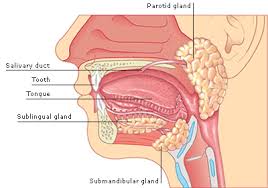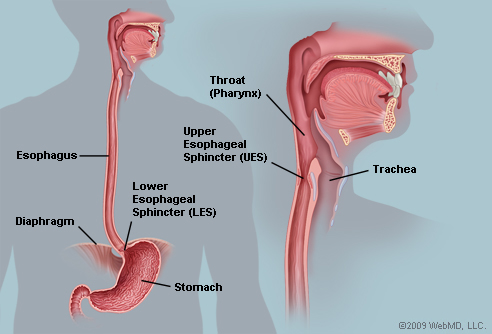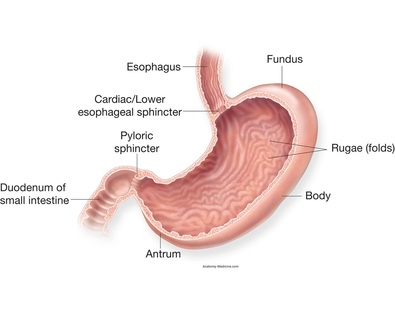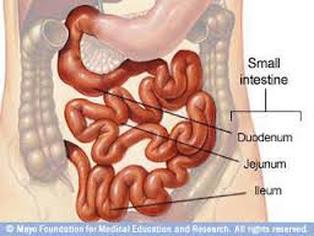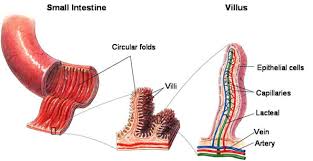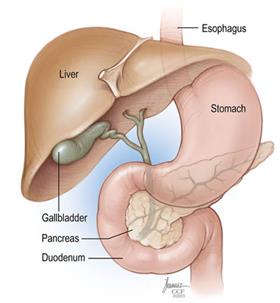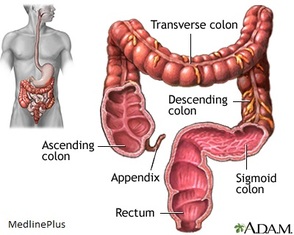Digestion simplified
Through years of practice, I have noticed that many people do not understand the basics of the anatomy and the function of their digestive system.
I find that understanding how your digestive system works helps you understand what are the normal sensations we will experience. This helps us recognize more quickly when something is wrong.
Many of our digestive complaints such as fullness, bloating, gas, cramps, diarrhea or constipation are simply a result of poor coordination of the movement of nutrients along the gastrointestinal tract.
I find that understanding how your digestive system works helps you understand what are the normal sensations we will experience. This helps us recognize more quickly when something is wrong.
Many of our digestive complaints such as fullness, bloating, gas, cramps, diarrhea or constipation are simply a result of poor coordination of the movement of nutrients along the gastrointestinal tract.
The Esophagus
|
The esophagus is a tube that helps pass the food bolus from your mouth to the stomach.
There are two important esophageal sphincters: the upper esophageal sphincter and the lower esophageal sphincter. The upper esophageal sphincter opens when you initiate the swallow and then closes immediately after to prevent the food from regurgitating back into your throat and potentially be aspirated into your lungs. The lower esophageal sphincter also opens as the food bolus goes down the esophagus and then closes immediately after to prevent the food and stomach acid from regurgitating back into the esophagus. Food does not just slide down the esophagus. It is pushed into the stomach by coordinated contraction waves called peristalsis. Without peristalsis, food will take a long time to pass into the stomach. |
This peristalsis occurs throughout the gastrointestinal tract and plays a very important role in nutrient digestion and absorption.
With just this basic knowledge of esophageal function, some abnormalities can be more easily understood.
As we age, the muscle of the upper esophageal sphincter called the cricopharyngeus muscle, can become hypertrophied which means it thickens. The sphincter then becomes too tight and does not open properly. This will give a sensation of difficulty initiating a swallow or that food is stuck in the throat.
If the lower esophageal sphincter relaxes at the wrong time, it will allow stomach contents to rise and we experience heartburn and regurgitation. This is called gastroesophageal reflux disease and is one of the most common digestive problems.
Rarely, the lower esophageal sphincter can be too tight preventing food from passing. This disease is called achalasia and the treatment is to cut the sphincter.
As we age, the muscle of the upper esophageal sphincter called the cricopharyngeus muscle, can become hypertrophied which means it thickens. The sphincter then becomes too tight and does not open properly. This will give a sensation of difficulty initiating a swallow or that food is stuck in the throat.
If the lower esophageal sphincter relaxes at the wrong time, it will allow stomach contents to rise and we experience heartburn and regurgitation. This is called gastroesophageal reflux disease and is one of the most common digestive problems.
Rarely, the lower esophageal sphincter can be too tight preventing food from passing. This disease is called achalasia and the treatment is to cut the sphincter.
The Stomach |
The stomach has just a few important jobs. The main role is to grind down the food particles into a pulpy fluid called chyme.
Only small particles will pass easily through the pylorus which is a sphincter that controls the flow of chyme into the duodenum. The fundus of the stomach is a storage zone that will relax and expand to accomodate the food you have just eaten. Gradually it will advance the food to the body of the stomach where the grinding occurs. The fundus is also important since there are nerve sensors there that regulate our sense of satiety (whether we feel full or not). The stomach produces an enzyme called pepsin that helps to break down proteins and it produces hydrochloric acid. The acid assists in the breakdown of food and in eradicating bacteria that we may have ingested. The stomach does NOT absorb any nutrients. All nutrient absorption occurs in the intestines. |
My patients often describe a sensation of poor digestion.
It is possible that their complaints arise from poorly coordinated movement of food from the fundus through the pylorus. If the stomach fundus does not relax properly, you will feel full more quickly and food will be dumped earlier into the body of the stomach. This may lead to slower production of chyme and slower emptying of the stomach. Similar problems can occur if the pylorus sphincter contracts and relaxes in an uncoordinated fashion.
It is possible that their complaints arise from poorly coordinated movement of food from the fundus through the pylorus. If the stomach fundus does not relax properly, you will feel full more quickly and food will be dumped earlier into the body of the stomach. This may lead to slower production of chyme and slower emptying of the stomach. Similar problems can occur if the pylorus sphincter contracts and relaxes in an uncoordinated fashion.
The Small IntestineAlmost all nutrient absorption occurs in the small intestine.
There are 3 parts to the small intestine: duodenum, jejunum and ileum. The small intestine has a special lining (mucosa) that contains villi. Villi are finger-like projections that increase dramatically the surface area of nutrient absorption. They also produce specialized enzymes that help absorption. One of these enzymes is lactase that helps to digest the sugar in milk called lactose. The small intestine villi can become inflamed and damaged in diseases such as celiac disease and Crohn's disease but it can also be damaged temporarily by a viral gastroenteritis or stomach flu. It may take a few weeks to regain full function of the villi and so your digestion may not feel normal for a period of time after a stomach flu. This explains why we tell our patients to eat more lightly and to avoid milk products when they have a viral gastroenteritis. |
The Pancreas and LiverThe pancreas and the liver are very important in the digestion process. The pancreas secretes enzymes that break down carbohydrates, proteins and fats into their basic elements that can then be readily absorbed.
The liver produces bile that is important in the digestion of fats. The bile is stored in the gallbladder and is delivered into the small intestine via the bile duct. When you eat, the gallbladder will contract to release the bile at the appropriate time. Both the bile and the pancreatic enzymes are secreted in the duodenum. |
It is not hard to understand that anything that disrupts the flow of bile or pancreatic enzymes will result in altered nutrient absorption. Patients with diseases such as chronic pancreatitis or liver cirrhosis will complain of poor digestion.
Anything that disrupts the proper mixing of the chyme with the bile and pancreatic enzymes will lead to poor digestion. People who have had their gallbladder removed may have difficulty eating fatty foods.
Anything that disrupts the proper mixing of the chyme with the bile and pancreatic enzymes will lead to poor digestion. People who have had their gallbladder removed may have difficulty eating fatty foods.
The Large IntestineThe role of the large intestine or colon is to process the non-absorbed residue from the small intestine to be excreted as feces.
The colon absorbs excess water and compacts the feces making it ready for defecation. It is stored in the rectum until you defecate. Most of the water is absorbed in the ascending colon while compaction occurs in the descending and sigmoid colon. Coordinated movement of the fecal matter along the colon is important. Disruption of that coordination can lead to sensations of gurgling, gas trapping, cramps and constipation. |
The bacteria in our colon (enteric flora) play an important role. They help to digest and absorb resistant carbohydrates and fats. The bacteria help absorb vitamin K and prevent infection by augmenting the colon immune system. There is still so much we do not understand about the role of the enteric flora in health and disease.
People often try to use probiotics which are active bacteria to modify their intestinal flora. Although some do find probiotics beneficial, our understanding of the type and dose of bacteria is still quite rudimentary.
People often try to use probiotics which are active bacteria to modify their intestinal flora. Although some do find probiotics beneficial, our understanding of the type and dose of bacteria is still quite rudimentary.
The Enteric Nervous System
|
Our gastrointestinal tract is controlled by a nervous system that is separate although connected with our brains. This enteric nervous system is in charge of the contractions, secretions and sensations of the whole gastrointestinal tract. This nervous system functions independently and we can not control it.
When the enteric nervous system is functioning well, we barely know it is there. We just swallow our food and later we get a signal to defecate. What happened in between is usually not important. Of course, when something is wrong such as an infection, the enteric nervous system signals our brain giving us messages of pain or discomfort. Some people suffer from digestive symptoms such as cramps, bloating or constipation because their enteric nervous system is not functioning properly. This malfunction leads to abnormal contractions and inappropriate sensory messages as if something is wrong. For many people, mental or physical stress can cause the enteric nervous system to function poorly so they get digestive problems during stress. This is the "butterflies in the stomach" expression. The gastrointestinal tract from the esophagus to the rectum can have an altered enteric nervous system function that will lead to symptoms associated with that part of the anatomy. |
A malfunctioning enteric nervous system can give the following: Esophagus - chest pain, heartburn, regurgitation Stomach - early fullness, nausea, pain or burning Small intestine - bloating, diarrhea, cramps Colon - bloating, gas, cramps, diarrhea or constipation |
click here for further information on digestion.
click here if you want to watch a very detailed video
click here if you want to watch a very detailed video
|
www.ourdigestivehealth.com
www.GadFriedman.com |

